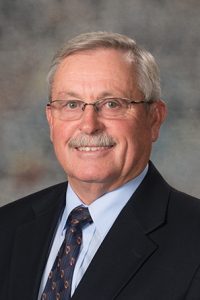Pay raise proposed for oil and gas commissioners
The Natural Resources Committee heard testimony Feb. 22 on a bill that would increase the pay of commissioners who serve on the Nebraska Oil and Gas Conservation Commission, which regulates the oil and natural gas exploration and production industry in the state.
The three commissioners each receive $50 for each day devoted to the business of the commission. Their pay is capped at $2,000 per year. Each commissioner also is reimbursed for necessary travel and other expenses.
LB713, introduced by Sen. Steve Erdman of Bayard, would increase commissioners’ pay to $500 per day and no more than $6,000 per year. Beginning in December 2020, and every five years thereafter, the director of the commission could recommend to voting members an increase or decrease in their compensation.
Erdman said the commission should have the authority to increase commissioners’ pay because the body’s funding does not come from the state’s general fund. Additionally, he said, the commissioners’ per diem has not been increased in decades.
“My concern is that it’s been a long time since they’ve seen a compensation increase,” Erdman said.
The commissioners can meet up to 12 times per year. According to the commission, its expenses would increase by $16,200 per fiscal year, assuming that the commissioners meet each month.
Dana Wreath, president of the Nebraska Petroleum Producers Association, testified in support of the bill. Wreath, who is also vice president of Wichita-based Berexco, said that Nebraska has one of the best oil and gas regulatory systems of the eight states in which his company operates. The current $50 a day is not enough to compensate commissioners for their time, he said.
“I don’t think we want to disincentive people or—perhaps even worse—have a situation where the only people who want to be on the commission have some particular ideological axe to grind,” Wreath said.
John Rundel, a current commissioner, also testified in support. He said each commissioner is self-employed and must take time away from his business and family to work for the commission. Rundel said he drives approximately four hours from his home in Trenton to Sidney, where the commission holds hearings, which sometimes results in a 12- to 14-hour day.
Few people have the technical expertise required to be a commissioner, he added, and the low pay could further reduce the pool of applicants for any future openings.
“I think anything we can do to make it easier for someone to serve is in the benefit of the state of Nebraska and for the oil and gas commission,” Rundel said.
Bill Sydow, director of the commission, provided neutral testimony on the bill. He said the conservation tax levied on oil and gas producers to fund the commission’s operations could cover the proposed pay increase. While the commissioners can meet up to 12 times annually, Sydow said, six meetings a year is the average. Commissioners do not get paid if they do not attend or if the commission does not meet.
Sydow said that commissioners need a variety of technical knowledge and experience. The commission acts as a quasi-judicial body, he said, which means that it must conduct its public hearings under the same rules as a district court. The commission can approve applications for projects costing millions of dollars, and commissioners need a good grasp of Nebraska law, as well as state rules and regulations, he added.
“Our commission and our commissioners I would put against anybody in the United States,” Sydow said. “As a team, we’re that good.”
No one testified in opposition to the bill, and the committee took no immediate action on it.

